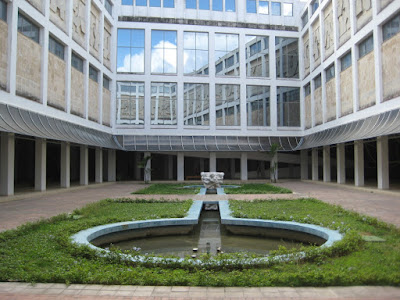Tuesday, April 4, 2017
A Metaphor for Stew
Cubans like to describe their fellow countrymen as stew. By that they mean their heritage is a rich cornucopia of African, Spanish, Caribbean and native influences. Originally inhabited by three tribes, Cuba saw its early natives decimated and destroyed by outside Spanish, French and English rule. It wasn’t until the early-nineteen hundreds that Cuba finally wrestled away control from the Spanish and began its long and very rocky road toward democracy.
While strolling San Juan Hill, I came across a plaque that proclaimed it the Cuban-Spanish-American War. It turns out there was a Cuban Army fighting the Spanish long before American business interests on the island forced our government to send in Teddy Roosevelt and his rough riders. Somehow our own history books glossed over the fact that American commercial interests dictated much of what the local government did and didn’t do for its people. Naturally the Cuban people take issue with our version of Teddy and company winning the war sans their support.
American business expansion including a sizeable investment from the mob came to a screeching halt when a former law student decided he’s had enough of their farmer turned general turned dictator. In the mid-fifties Fidel Castro turned tables on dictator Batista and stopped the clock for all intents and purposes. Cuba has been locked in a time warp ever since Fidel embraced socialism in lieu of capitalism.
The average income for a Cuban family is roughly $20.00 per month. Even with free food rations, free education and free health care, there is little incentive for the average Cuban to work hard. As the poor step-child to the kremlin for more than fifty years, it was only the collapse of Mother Russia that shook Cuba out of his sheltered existence and forced it to face the harsh economic reality of the modern-day world.
The first factor contributing to the GDP are health care services. This comes in at seventy-three percent of GDP. Cuba has been farming out its doctors, psychologists, nurses and other health care professionals to Central and South American countries for years. Tourism ranked second in GDP at twenty-two percent with the government poking its financial fingers into everything from hotels, cigar sales, and rum sales to the Tropicana Cabaret.
It has only been in the last several years that the government has reluctantly pried open the tight squeaky doors of capitalism and free enterprise to outside interests. But with fifty to seventy-five percent of the population working for the government, it leaves little incentive for outside work. Add to that the fact that (per Western Union) Sixty-Two percent of the population receives remittances from relatives in the United States and the concept of hard work equals success is a difficult one to embrace.
Wandering the rough cobble-stone streets of Old Town, Havana, Sharon and I were transported back to 1955 with American cars streaming down the boulevards and the grand facades of marvelous old buildings. But a closer look beyond the façade and one can see the crumbling guts of those buildings and blue smoke belching out of worn piston rings and antiquated automobile engines.
Every town seems to have its collection of wonderful old mansion and grand buildings now run by the government. They are the sad reminders of what the country once was. Castro’s purge was quick and effective. Capitalists and anyone opposed to the regime had barely weeks to leave the island. They left behind businesses, homes and a way of life that had eluded the masses.
Yet in their quest to help the people, the new government sucked the economic life out of the country. Replacing business owners with farmers to manage a plant only invites total collapse. Kicking the middle and upper class out of town only exasperates the problem of poverty and economic ruin. The rich got booted out of town but they took with them the means by which so many others might hope to climb the ladder of success. Then Mother Russia came along and the incentive for change and advancement totally disappeared.
For anyone worried about Cuba changing into a ‘Starbucks on every corner’ there is no rush. Even if KFC and that coffee giant were to plant their flags of capitalism in Old Town, Havana it would only be the tourists who could afford a cup of Joe and a chicken leg.
Pay-to-pee is still a common day occurrence everyplace a tourist might go. That and the absence of toilet seats makes one want to control bodily functions until a safe haven can be found. In fact, we were all advised to bring our own toilet paper when off the ship and they weren’t kidding.
At the National Museum of Art, Sharon was handed three sheets (and it wasn’t double-ply) then had to pay for the privilege. I encountered the same thing in Peru when I went there on a film shoot but that was in the mid-eighties and the country was still fighting the Shining Path.
In time, Cuba will evolve and embrace capitalism to a greater degree. The people there are adamant about retaining their cultural traditions and history. I admire them for that. The idea that one might travel to a foreign country and not find a Starbucks on every street corner is a pretty empowering image. I hope they can do it.















No comments:
Post a Comment